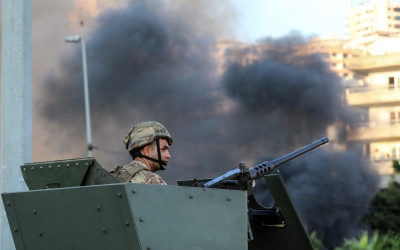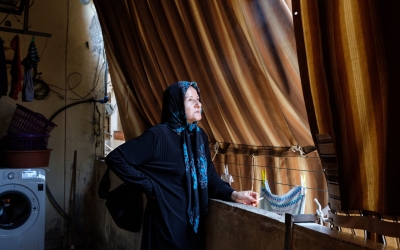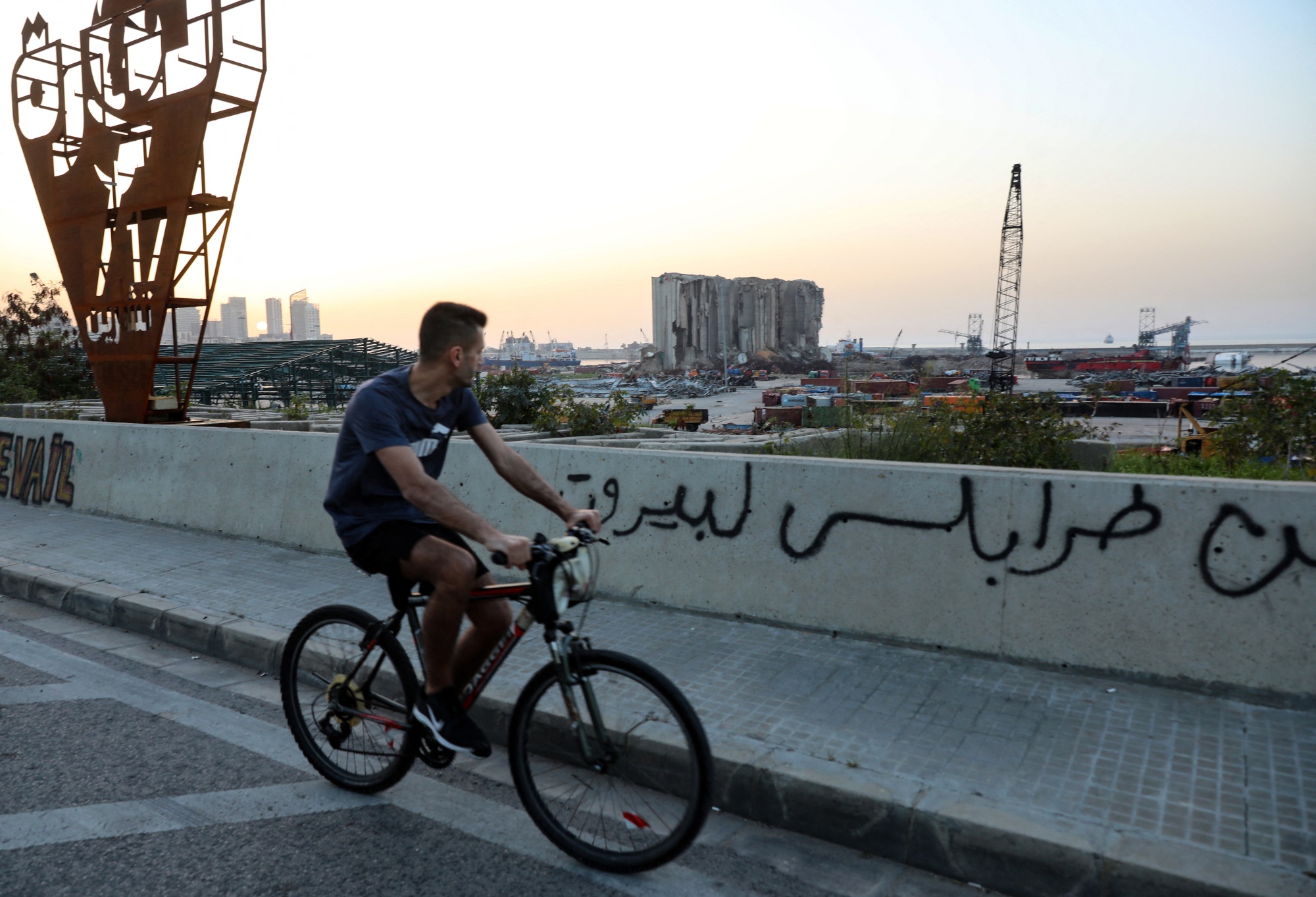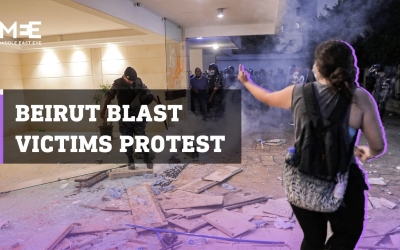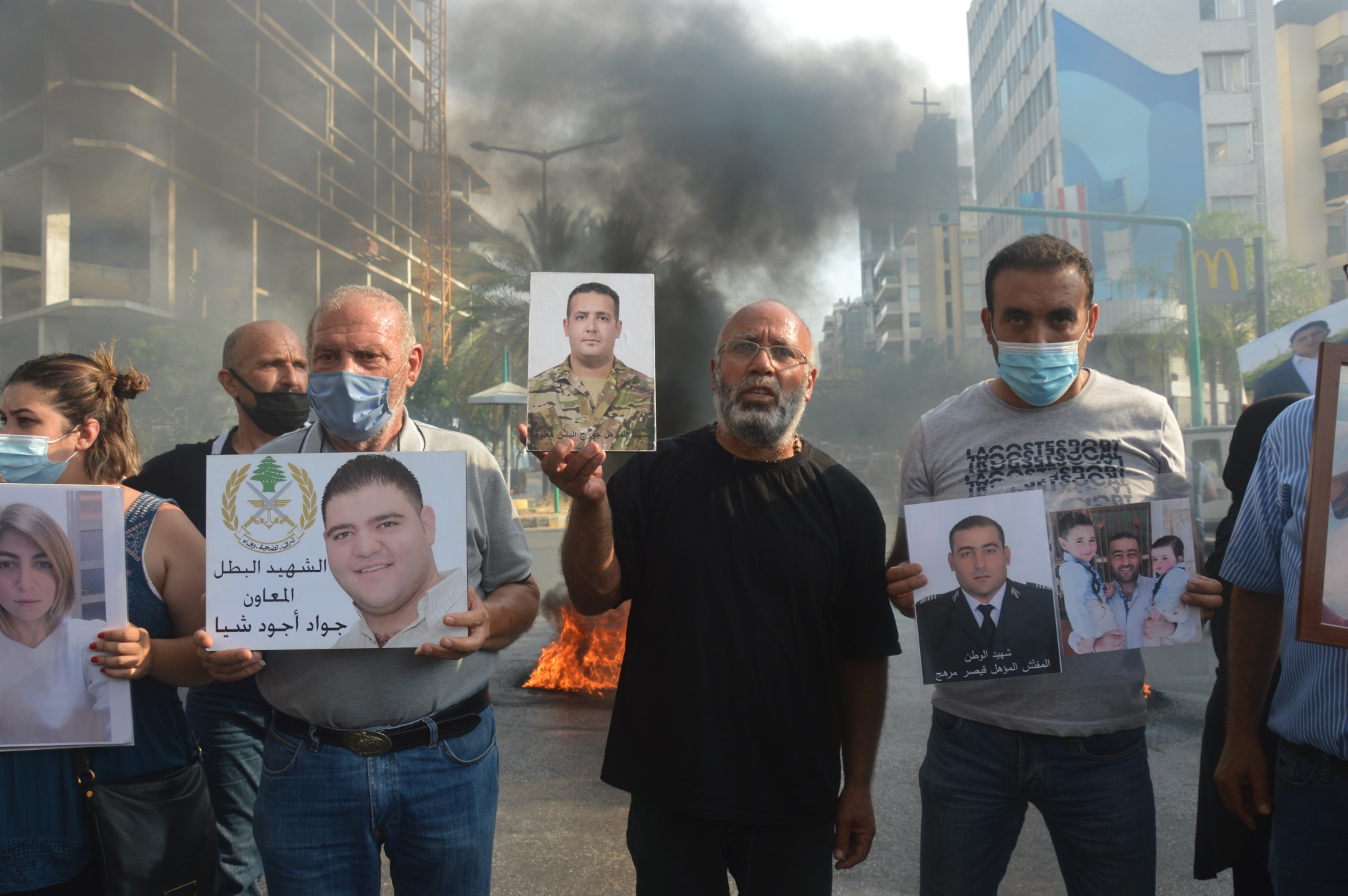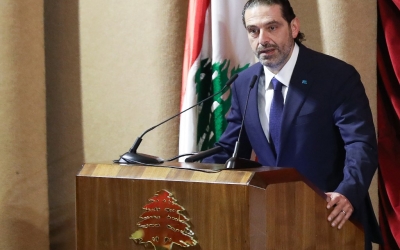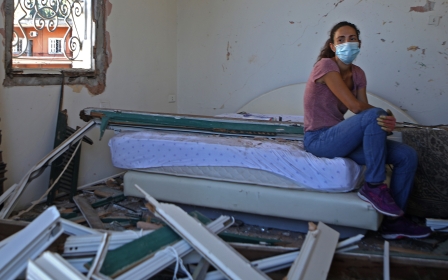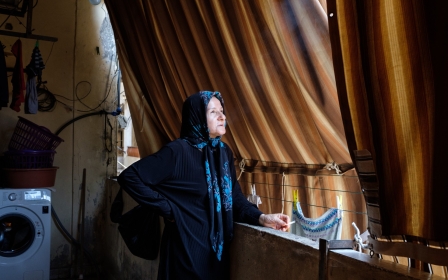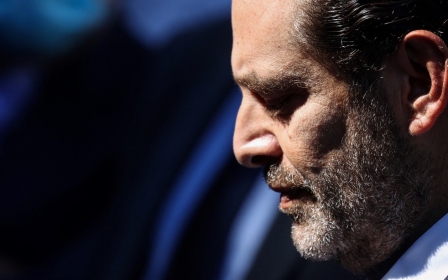Beirut port explosion: One year on, families still search for answers
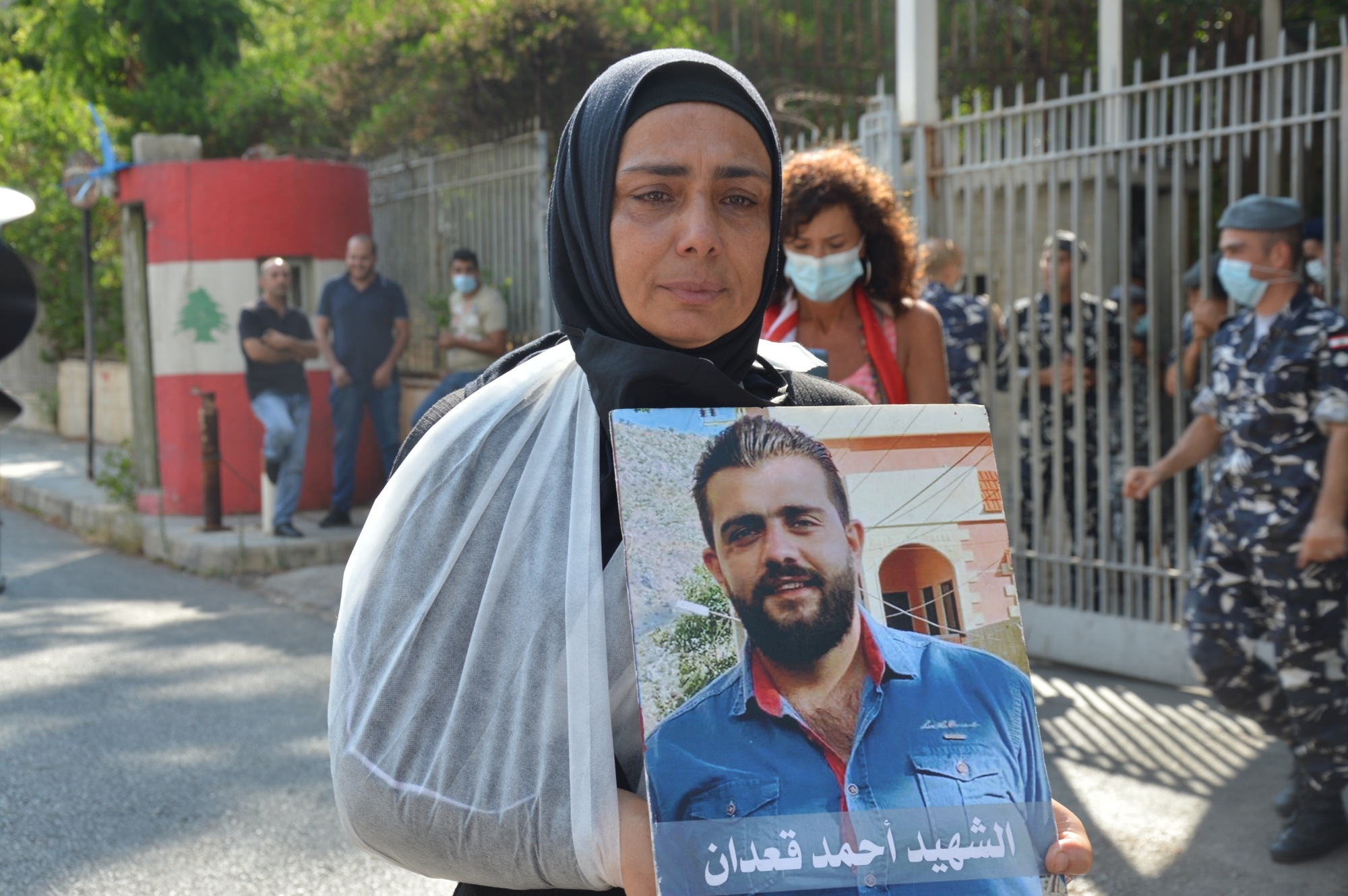
Samia Makki Abbas, 31, and her family had been living in The Gambia, where her husband Mohammad Abbas, 38, worked as an engineer. But when Mohammad got sick with Covid-19 last summer, the family returned to their home country, Lebanon, via air ambulance in order for Mohammad to be treated in the intensive care unit (ICU) at Saint George’s Hospital in Beirut, while Makki and their children were quarantining in her mother’s home outside of the capital.
“Mohammad was in a bad condition when we arrived in Beirut, but day by day he was getting much better,” Makki told Middle East Eye.
New MEE newsletter: Jerusalem Dispatch
Sign up to get the latest insights and analysis on Israel-Palestine, alongside Turkey Unpacked and other MEE newsletters
One evening, Makki called the hospital, where personnel told her that her husband was well enough to be taken out of the ICU the next day.
But suddenly, the call dropped.
Makki tried to call the hospital back, but the line was down. Unbeknownst to her, a massive explosion had just occurred in Beirut’s port, less than a kilometre away from St George’s hospital, ripping through entire neighbourhoods of the Lebanese capital. She would only find out that Mohammad was among those killed by the blast via Facebook.
The Beirut explosion on 4 August 2020 not only killed at least 202 people - with some reporting tolls as high as 217 - but also wounded some 6,500 people, and left 300,000 homeless.
Residents of Lebanon - already struggling because of the pandemic, a crippling economic crisis and simmering anger at the country’s political class in the wake of the October 2019 uprising - were left reeling by the tragedy.
One year on, hundreds of families who continue to mourn their loved ones have yet to receive answers on how hundreds of tonnes of ammonium nitrate, which can be used to make fertiliser or bombs, were left unsafely stored in the capital for years, leading to one of the biggest non-nuclear explosions in history.
Despite an ongoing investigation, relatives like Makki remain frustrated over the lack of accountability for those seen as responsible for the blast.
Oscillating between rage and sorrow, families struggle to make sense of the tragedy a year later, as their living conditions have further worsened and impunity remains rampant.
‘Lebanon takes everything from you’
As the anniversary of the explosion approaches, survivors continue to relive the terrible moments when they lost their loved ones.
Mariana Fodoulian’s sister Gaia, was among those who died that day. The 29-year-old was at home with her mother in the neighbourhood of Ashrafieh while Mariana was still at work when at least 500 tonnes of ammonium nitrate detonated at 6:07 pm in the port.
“I called my mum to see what happened to them. She was screaming repeatedly: 'Gaia ambulance, Gaia ambulance',” Fodoulian, 31, told MEE.
When she finally reached her house, amid the traffic jams and general chaos generated by the explosion, Fodoulian found her sister lying on the floor. After providing her with first aid, she brought Gaia to three different hospitals hoping to get her treatment - but medical personnel were overwhelmed by the arrival of thousands of injured people and family members looking for their relatives, while many health facilities were themselves damaged in the blast.
“I had to fight to get into the hospital to see my sister. Doctors didn't tell me she was dead,” Fodoulian said. “I had to wait two days before burying her.”
Since Gaia’s death, Fodoulian and her mother have focused their energies into the late young woman’s art gallery project, and also established an organisation to support and care for stray animals in memory of Gaia’s volunteering.
“It is hard for my mum to live without Gaia, because she was used to talking with her every waking moment,” Fodoulian said. “For me, it is also really hard. She was the only one who knew everything about me. Now I have to keep everything inside.”
While Fodoulian was able to see her sister before she passed away, Salam Iskandar was not able to say goodbye.
The 34-year-old was far from Beirut, in the town of Hermel in Lebanon’s Beqaa Valley, when her brother Hamza, 24, a soldier in the Lebanese army, died in the explosion.
Iskandar found out her brother was dead from a Facebook post by one of Hamza’s colleagues and friends.
'Lebanese politicians are criminals. They ruined our life' - Samia Makki Abbas, wife of Beirut blast victim
“(After five days), army personnel came to our house to collect DNA samples from my dad,” she told MEE. “When I called Hamza’s superior, he confirmed Hamza was dead. I wanted to see his body, but he said there were only remains left. DNA analysis was used to confirm those remains belonged to Hamza.”
Two months after Hamza, Iskandar’s mother also passed away, causing further hardship to the already distressed family.
“After my mum died, my dad couldn’t stop crying,” she said. “He was so stressed that his eyesight became damaged. Now, we don’t have money to buy medicine for him, and we ask for help from our relatives.”
Lebanon’s economic crisis - which has further spiralled since the blast - has notably led to a healthcare crisis in the country, with costs skyrocketing amid severe medical shortages.
Although she continues to fight to obtain justice for her brother, Iskandar says she now hates Beirut, and will only travel to the capital to pay tribute to her brother and other victims of the explosion.
One of her biggest worries is now the future of her children.
“I am afraid for my son. He wants to join the army like my brother did, but I don’t want him to,” she said. “I can’t let my son join the army. Lebanon takes everything away from you.”
Like Iskandar, Makki is also afraid for her children. She decided to leave Lebanon permanently and relocate to Africa after her husband died in the explosion.
“There is no future for my children in Lebanon. Living abroad is better and safer for them,” she said.
A languishing investigation
Almost immediately after the explosion, news emerged that a shipment of 2,754 tonnes of ammonium nitrate, confiscated from a Russian-leased cargo ship in 2013, had been stored in unsafe conditions for years in the port, right in the heart of Beirut.
But a year on, many questions remain unanswered - including which officials were aware of the situation, and why they didn’t act to address the deadly threat.
A judicial complaint was first filed eight days after the explosion by United for Lebanon, an independent non-profit organisation focused on tackling corruption, accusing 28 people of being responsible for the explosion. In October, the Beirut Bar Association announced it had submitted 679 criminal complaints to the Judicial Council related to the blast.
But the path to the truth has been gruelling and filled with pitfalls.
The first judge tasked with the investigation, Fadi Sawan, was removed from the case in February, after his tactics reportedly hit a nerve with Lebanon’s political class.
In December, Sawan had charged and summoned three ex-ministers and caretaker Prime Minister Hassan Diab. Two of the former ministers, Ali Hasan Khalil and Ghazi Zeitar, filed requests for the judge to be taken off the case, arguing that the fact that Sawan’s home was among the tens of thousands of buildings damaged in the blast put his impartiality into question.
Sawan’s successor, Tarek Bitar, has also faced hurdles, with MPs stalling a vote on the new judge’s request to lift immunity from prosecution for political figures and high-level security officials suspected in the case.
The snail pace of the investigation has not deterred the families of the victims, who have taken to the streets every month to pay tribute to their loved ones and demonstrated outside ministries to demand justice - despite being faced with violent repression by Lebanese forces.
“As families of Beirut blast victims, we took to the streets to pressure authorities to continue the investigation. We talked with Judge Bitar many times, but investigations are secret. He was not able to tell us much, but I trust him,” Fodoulian said.
In parallel with parliamentarian’s reticence to allow Bitar to prosecute political figures, Lebanese NGO Legal Agenda revealed in July that more than 50 MPs had signed a motion to open a parallel investigation into the explosion - a move that has been seen as yet another attempt by the country’s notoriously corrupt political elite to obstruct Bitar’s efforts.
But in recent days, some MPs have claimed to be ready to lift political immunity - a change likely prompted by external factors including international pressure, the nomination of new prime minister-designate Najib Mikati, and growing tensions on the eve of the Beirut blast anniversary.
For Fodoulian, who leads one of the victims’ families groups, political reticence to achieve accountability means that Bitar’s investigation is doing good work.
“They have to pay for what they did. If we have no justice, these tragedies will happen again,” she said.
Others, meanwhile, believe that justice cannot be achieved so long as the investigation into the explosion is at the mercy of Lebanon’s ruling class - and have called for an independent international inquiry.
‘Every day is 4 August’
With Lebanon’s elite seemingly more focused on its own survival than on uncovering what led to the tragedy of 4 August 2020, relatives of the victims struggle to move forward, stuck in an endless cycle of grief.
“Mohammad was my best friend, my everything,” Makki said. “My life changed completely. I left Lebanon, and now I live abroad with my two kids.
“My children will know their father only through pictures. My daughter cries every night for him, and she is afraid to lose me like her dad,” she added.
Rami Ollaik, the founder of United for Lebanon, told MEE that the entire country needs to know the truth about the explosion.
“We need to know the truth first of all - and after that, we need justice to prevail,” he said.
Justice for the Beirut port explosion, Ollaik said, would also mean putting an end to rampant impunity, a prevalent feature of the country’s history since before the 1975-90 civil war.
“Since Lebanon got its independence, there have been a lot of crimes, but no criminals,” he said. “This has to stop.”
Like many other Lebanese citizens, Makki places the blame for the explosion squarely on the Lebanese political system.
“Lebanese politicians are criminals. They ruined our life,” she said.
With accountability still elusive one year later, relatives like Ali Kenno, 42, find themselves trapped in the past, unable to move on from the tragedy.
Kenno lost his 16-year-old daughter Sidra, who was killed while walking in the street in one of the neighbourhoods affected by the explosion.
“I wasn’t there when she passed away. My son told me what happened to my daughter,” he told MEE.
“Now, every day is the fourth of August. Every day that passes is 4 August.”
Middle East Eye delivers independent and unrivalled coverage and analysis of the Middle East, North Africa and beyond. To learn more about republishing this content and the associated fees, please fill out this form. More about MEE can be found here.


